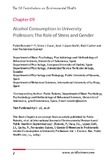Mostrar el registro sencillo del ítem
Alcohol consumption in university professors: the role of stress and gender
| dc.creator | Ruisoto, Pablo | es_ES |
| dc.creator | Vaca Gallegos, Silvia | es_ES |
| dc.creator | López-Goñi, José Javier | es_ES |
| dc.creator | Cacho Fernández, Raúl | es_ES |
| dc.creator | Fernández Suárez, Iván | es_ES |
| dc.date.accessioned | 2018-10-29T10:40:34Z | |
| dc.date.available | 2018-10-29T10:40:34Z | |
| dc.date.issued | 2018 | |
| dc.identifier.uri | https://hdl.handle.net/2454/31268 | |
| dc.description.abstract | The role of job satisfaction and other psychosocial variables in problematic alcohol consumption within professional settings remains understudied. The aim of this study is to assess the level of problematic alcohol consumption among male and female university professors and associated psychosocial variables. A total of 360 professors (183 men and 177 women) of a large private university in Ecuador were surveyed using standardized instruments for the following psychosocial measures: alcohol consumption, job satisfaction, psychological stress, psychological flexibility, social support and resilience. Problematic alcohol consumption was found in 13.1% of participants, although this was significantly higher (χ2 = 15.6; d.f. = 2, p < 0.001) in men (19.1%) than women (6.8%). Problematic alcohol consumption was reported in men with higher perceived stress and job satisfaction. However, 83.3% of women with problematic alcohol use reported lower job satisfaction and higher psychological inflexibility. Results suggest that job satisfaction itself did not prevent problematic alcohol consumption in men; stress was associated with problematic consumption in men and psychological inflexibility in women. Findings from this study support the need to assess aspects of alcohol consumption and problematic behavior differently among men and women. Intervention strategies aimed at preventing or reducing problematic alcohol consumption in university professors must be different for men and women. | en |
| dc.description.sponsorship | This study was funded by the Particular Technical University of Loja (Ecuador) and the National Council for the Control of Narcotic Drugs and Psychotropic Substances (CONSEP), including the funds for covering the costs of publishing in open access. Authors would also like to thank to National Secretary for Higher Education, Science, Technology and Innovation (SENESCYT) of the Republic of Ecuador for its support via Project Prometeo. | en |
| dc.format.mimetype | application/pdf | en |
| dc.language.iso | eng | en |
| dc.relation.ispartof | Top 10 Contributions on Environmental Health. Avid Science, 2018 | en |
| dc.rights | © 2018 Pablo Ruisoto, et al. Creative Commons Attribution 4.0 International (CC BY 4.0) | en |
| dc.rights.uri | https://creativecommons.org/licenses/by/4.0/ | |
| dc.subject | Alcohol | en |
| dc.subject | Gender | en |
| dc.subject | University context | en |
| dc.subject | Professors | en |
| dc.subject | Job satisfaction | en |
| dc.title | Alcohol consumption in university professors: the role of stress and gender | en |
| dc.type | Capítulo de libro / Liburuen kapitulua | es |
| dc.type | info:eu-repo/semantics/bookPart | en |
| dc.contributor.department | Ciencias de la Salud | es_ES |
| dc.contributor.department | Osasun Zientziak | eu |
| dc.rights.accessRights | Acceso abierto / Sarbide irekia | es |
| dc.rights.accessRights | info:eu-repo/semantics/openAccess | en |
| dc.type.version | Versión publicada / Argitaratu den bertsioa | es |
| dc.type.version | info:eu-repo/semantics/publishedVersion | en |



